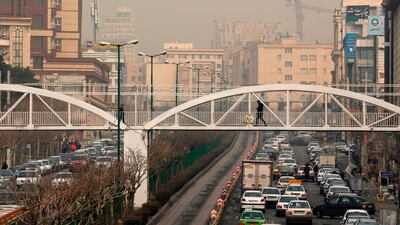Iranian authorities closed almost a dozen currency-exchange offices and arrested traders, as part of an effort to stem a fall in the value of the Iranian rial that could push up prices at a time of growing discontent.
The rial weakened to 49,580 to the dollar in unregulated trading on Tuesday, according to state-run media, with reports of some transactions reaching a record low of 50,000 rials. It strengthened to 48,350 Wednesday. A year ago it stood at 38,250.
The commander of the Greater Tehran police force Hossein Rahimi said about 90 currency dealers had been detained, according to the official Islamic Republic News Agency, without giving further details. The registered houses offer higher exchange rates to the dollar than official banks, making them popular with Iranians with hard currency to sell.
For Iranians expecting higher inflation and looking to protect their savings, the dollar is a “safe haven”, said Mazdak Rafaty, managing partner at UAE-based Ludwar International Consulting, which advises European companies operating in the Middle East. Depreciation shows a “mistrust in the local economic structures and leaders,” he said.
The government of President Hassan Rouhani is under growing pressure from its political opponents and ordinary Iranians to prove it can revive the economy, with foreign investors wary of further US sanctions as President Donald Trump intensifies his confrontation with the Islamic Republic.
_______________
Read more:
Britain troubled by the threat from Iran, says UK foreign affairs chairman
Man shot in Iran after trying to break into president's office
_______________
Days of popular protests erupted in December over economic conditions, the most serious challenge faced by the government in a decade.
Living standards haven’t broadly improved since Iran signed the nuclear accord that eased international sanctions, while some supporters are disappointed that the president hasn’t fulfilled promises to relax political and social restrictions.
Policymakers last month asked the government to raise subsidies for the poor and scale back a proposed sovereign bond issue before they would approve Mr Rouhani’s budget proposal.
Officials from Mr Rouhani to central bank governor Valiollah Seif have in recent weeks sought to downplay the depreciation of the rial and portray it as temporary. The government “has no difficulties accessing foreign currency and no shortage in its reserves,” government spokesman Mohammad Bagher Nobakht told reporters in Tehran, according to a state television report. Currency markets are witnessing an “unreal and unnecessary demand,” he said on Tuesday. Others have rounded on what they see as speculation.
"Newcomers to the currency market" are looking to profit from the "growing gap between the official and the street rate," Ali Mirzakhani, editor-in-chief of the Donya-e-Eghtesad economic newspaper, wrote in its Tuesday edition. Demand fuelled by "speculators" must be controlled, he said.
“There are some profiteers in the market who want to see the market rise, the dollar keep going up,” said one currency trader, Khosrow Abdi, who is based in Tehran’s main street for foreign-exchange dealing.

